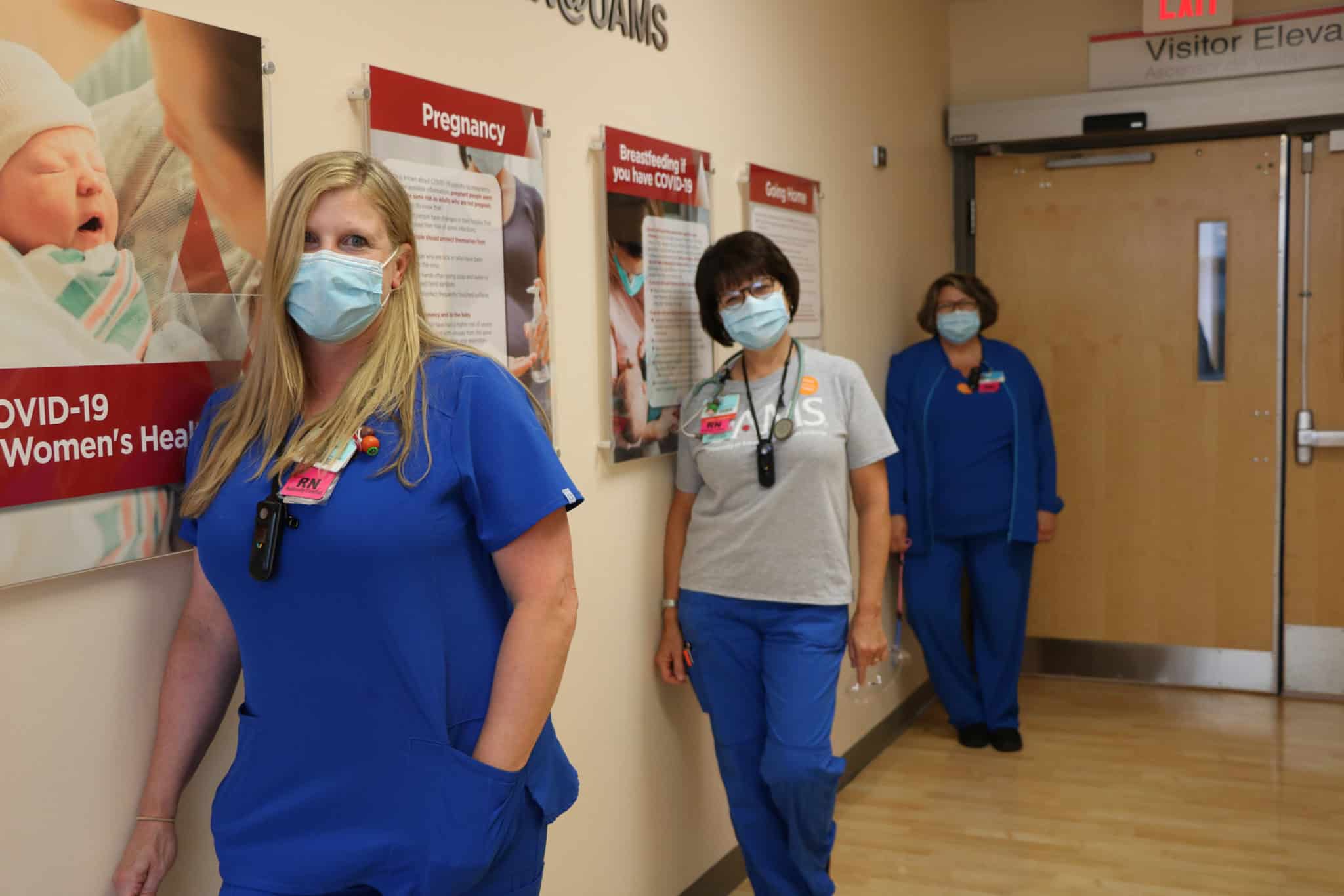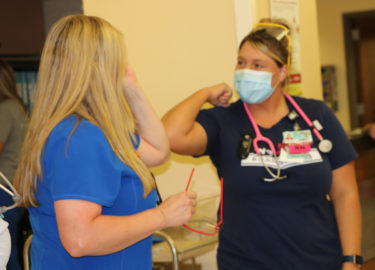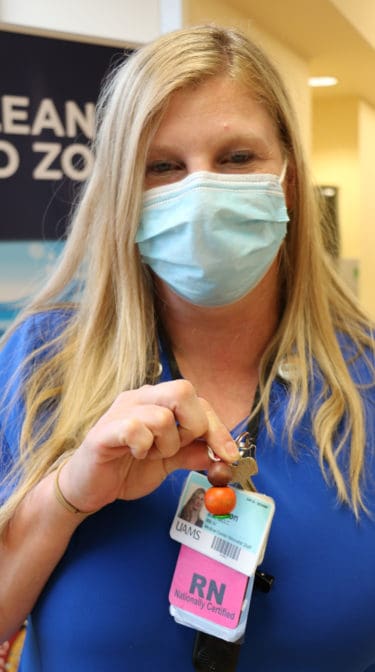View Larger Image

Suzie Branton, BSN, IBCLC; Linda Pabin, RN, IBCLC, and Denise Gill, BSN, IBCLC.
Lactation Consultants Help Set Up Mom, Baby for Success
| Having a baby is one of those life markers a mom typically reflects on fondly, though some women experience nine months of discomfort and a difficult labor and recovery. Then there’s breastfeeding, which for some moms has its own set of trials, starting with the baby not latching correctly, cracked nipples or insufficient milk production. But new moms aren’t on their own at UAMS, where a team of lactation consultants roams the halls to help every new mom who needs it.
Three on the team are Suzie Branton, Denise Gill and Linda Pabin, all registered nurses (Branton and Gill with a Bachelor’s of Science in Nursing) trained as International Board Certified Lactation Consultants. The trio have been at UAMS for a combined 38 years and have helped thousands of moms.
“I chose to be a lactation consultant after I had been a postpartum nurse for five years,” said Branton. “I wanted to be able to help (moms), support them and be their advocate. Lactation is a field that never gets old because it overlaps with almost every discipline out there: biology, microbiology, chemistry, economics, public health. I could go on. Every day we are learning more and more about the benefits of breastfeeding for both moms and babies.”
The Centers for Disease Control and Prevention (CDC) has anchored its obesity reduction strategy in breastfeeding, along with healthy nutrition and physical activity. According to the CDC, 60% of moms do not breastfeed as long as they intend to. In Arkansas, only 43% hit the six-month mark, which is the time span the CDC recommends for exclusive breastfeeding.
Branton said she believes moms will be set up for success if they’re equipped with knowledge and have someone there to guide them through the rough spots. When asked how long a new mom should try to breastfeed, her response was not cookie cutter.
“That is an individual choice, and with the right amount of guidance and education, she might not have to ‘try.’ ‘Try’ might be the wrong word. What we find is that the more knowledge and support a couple has going in, the better prepared and ultimately more successful they will be. Our job is to support, advocate, educate, facilitate and create a plan of care that is based on the family’s needs. It’s an individual threshold. We are not in their shoes. We give them the information and support they need in order to make that choice,” Branton said.
Moms may abandon breastfeeding early because of problems with milk production and proper latching, lack of family support, unsupportive work policies and lack of parental leave and unsupportive hospital practices and policies. UAMS saw the importance of breastfeeding and worked with the lactation consultants to be designated a “baby friendly hospital” for its policies that encouraging new mothers to breastfeed. The World Health Organization (WHO) and the United Nations Children’s Fund (UNICEF) launched the Baby-Friendly Hospital Initiative in 1991 to give mothers the information, confidence and skills needed to breastfeed successfully. UAMS also works with the CDC on its State Physical Activity and Nutrition grant, which focuses on training family physicians to promote breastfeeding to their patients.
Gill said there is nothing better than watching a new mother blossom and feel empowered to feed and care for her baby.
“We love the education piece,” Gill said. “We are in a role where we can really spend time with these families. There is a lot of counseling involved, as well as critical thinking that keeps us on our toes. It’s a lot to learn.”
One of the misconceptions new moms have is that a baby needs more breastmilk than is necessary, which is why all the lactation consultants wear a string of wooden colored beads on their name tags.

Branton celebrates with a fellow nurse after hearing one of their babies gained 1% of its body weight.
“The belly beads are a teaching tool — a strong visual aid that represents the size of a newborn’s stomach on day of life one and three. One of the most common worries is, ‘Is my baby getting enough?’ and this helps to understand how much their baby needs in the early days,” said Branton.
The lactation consultant team recently has broadened its reach beyond UAMS. Melissa Zielinski, a clinical psychologist in the UAMS Department of Psychiatry, began a program called Growing Together where she and the lactation consultants help incarcerated women at the J. Aaron Hawkins Sr. Center in Wrightsville who are pre- or post-partum and want to breastfeed their infants.
Gill said, “Why should these babies, who already have barriers, be excluded from the benefits of their mother’s milk? It also helps mothers feel connected to their babies while separated, and some research suggests it cuts down on recidivism, so everyone wins.”
